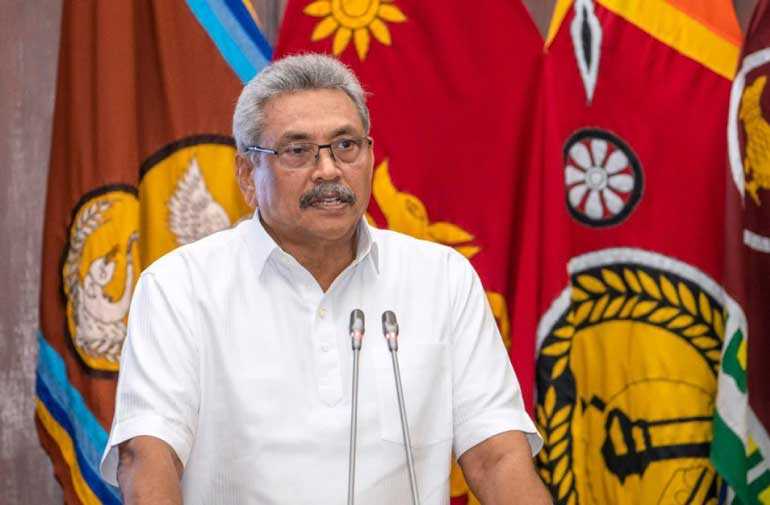Tuesday Feb 24, 2026
Tuesday Feb 24, 2026
Monday, 27 January 2020 01:47 - - {{hitsCtrl.values.hits}}

President Gotabaya Rajapaksa
By Chandani Kirinde
President Gotabaya Rajapaksa has appointed a 12-member high-powered Task Force for Poverty Eradication and Livelihood Development with wide powers and a year-long mandate to ensure that the Government programs to uplift the lives of low-income families is a successfully executed.
The Committee will be headed by Retired Deputy Secretary to the Treasury S.B. Divarathne and consists of academics, medical professionals and Government Medical Officers’ Association President Dr. Anuruddha Padeniya as well as members of the private sector. The other members of the Task Force are Retired Ministry Secretary V. Sivagnanasothy, University of Peradeniya Senior Lecturer Prof. H.M.W. Ariyarathna Herath, University of Kelaniya’s Prof. Shirantha Heenkenda, University of Jaffna Senior Lecturer Dr. S.S. Sivakumar, retired District Secretary Nimal Abeysiri, Medical Consultant Dr. Sanjeewani Hapugoda, retired Major General Sumedha Perera, Ceylon Chamber of Commerce’s Gayathri Gunaruwan, E.W. Creasy and Company Executive Officer Sanjeewa Gunawardana and Nature’s Secrets Chairman Samantha Kumarasinghe.
Among the tasks assigned to the Task Force are coordinating with the Ministry of Finance, Economy and Policy Development, Regional Development Bank, Samurdhi Bank, cooperative banks, housing development and finance corporation and micro-finance institutions to provide financial facilities for needy and low income earning communities prioritising small-scale business development, self-employment, cottage industry development initiatives and facilitating and coordinating with the relevant institution in mobilising funding provided by various international banks and funds to make this program a success.
Initiating necessary measures for the Corporate Social Responsibility (CSR) programs launched by the private sector to be linked as far as possible to the national program for the eradication of poverty is also anticipated.
The Task Force will oversee the implementation of programs for supply of essential food items in order to ensure the food security of Samurdhi beneficiaries, coordinate with Lanka Sathosa, CWE, the Cooperative system and Mark-Fed in expanding the network for the supply of foods and other essential items and incentivising and mobilising local suppliers in supplying foods and other commodities at concessionary prices through the above retail network.
The establishment of a network of authorised dealers at grass root level in order to expand the supply network through Lanka Sathosa and other such institutions while giving priority to women’s entrepreneurship in the expansion of the authorised dealers’ network is also part of the work assigned to the Task Force.
Its other tasks include coordinating with the multi-purpose Task Force to ensure the availability of sustainable livelihood programs for the 100,000 needy families identified in respect of the 100,000 employment program, coordinating with the Ministry of Highways, Provincial Councils and Pradeshiya Sabhas for the implementation of the 100,000 KM rural road development program for the provision of a good quality road system for the people mostly resident in rural, estate and semi-urban areas and coordination with the Ministry of Urban Development, Water Supply and Housing facilities and the Water Supply and Drainage Board to ensure the provision of 150,000 water supply lines in order to satisfactorily to meet the needs of the people in vulnerable areas.
The Task Force will also be coordinating with the Ministry of Lands, Lands Commissioner’s Department and ‘Bim Saviya’ program in providing long-term permits on 30-year lease basis for agricultural and business development to those identified from among the poor and low income earning people, coordinate with Local Government institutions, District Secretariats, Divisional Secretariats and other Government institutions to ensure these communities have been provided with facilities for the delivery of services at grass-root level and work with the Department of Wildlife and Divisional Secretariats in providing protection for the villages and cultivated lands from wild elephants.
The Task Force has been given powers to issue instructions, make inquiries and investigate matters in relation to the duties assigned by them to public officials.
The President has directed that all public officers and such other persons to whom the Task Force on Poverty Eradication and Livelihood Development issues instructions or applies for assistance for information to comply with them and render all such assistance and furnish all such information.
The President has directed that he be kept informed of all instances where any Government employee or an officer in any ministry, Government department, State corporation or any such institution who delays the performance of duties and fulfilment of responsibilities.
The gazette notification appointing the Task Force said poverty had been a major drawback in the country achieving its development goals for a secure and prosperous nation and that the need had arisen for strategies to be adopted for empowerment of low income communities based on a people-centric economy.
It added that it was imperative that a novel approach was established by expanding access to finance through banking and financial institutions as was deemed appropriate for the rural, plantation and low-income earning people to be directly linked to the process of economic empowerment locally as entrepreneurs by reviving the small and medium scale enterprises through the established Government machinery such as Central Government ministries, District Secretariats and Divisional Secretariats.